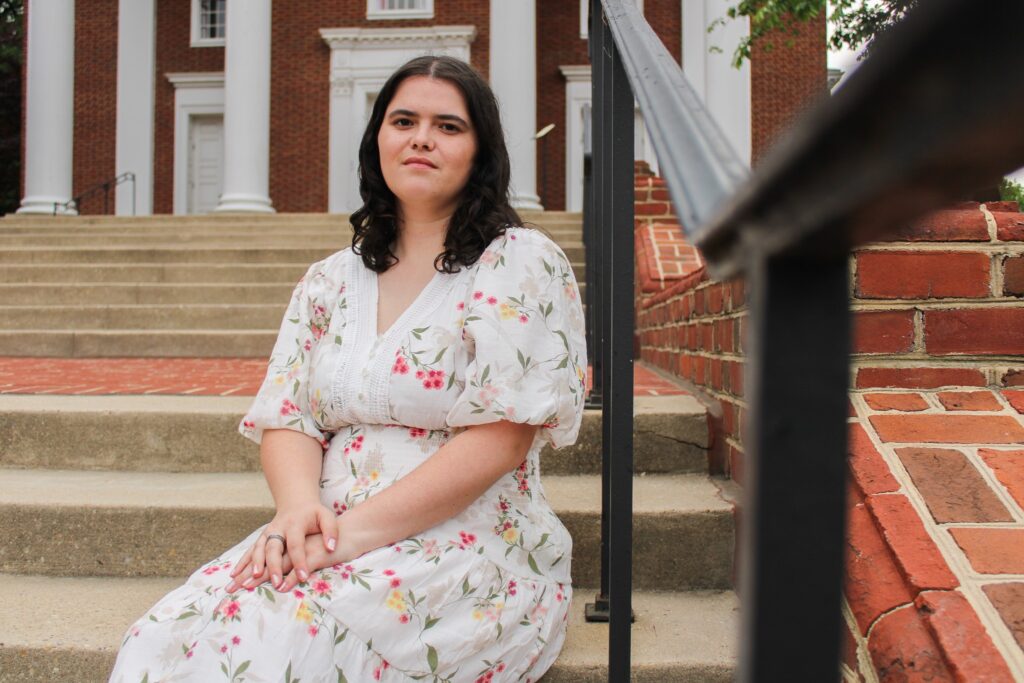College students move across state lines — and lose access to therapy as a result
By CAROLINE PECORA
Eli Greene, a senior animal science major at the University of Maryland, built a strong relationship with a therapist from the school’s counseling center, but when she went home to Florida for the summer, she had to find a new therapist on her own.
Carrie Connell, 20, didn’t know that leaving her home state of Florida for college in North Carolina meant she had to say goodbye to her therapist at home.
Meanwhile, 20-year-old Mo Cincera had to leave a therapist in Pennsylvania upon registering for school at American University in Washington, D.C.
“This is really dumb,” Cincera said.
These stories are not unique. Young people all over the United States lose access to their therapists when they move across state lines, simply because therapists aren’t licensed to practice everywhere. States license health service providers — and even in an age of virtual medical appointments, they can only offer care to patients in a state where they’re licensed.
And while there’s a compact that makes driver’s licenses valid from state to state, there’s no such automatic reciprocity when it comes to medical licensing.
Chetan Joshi, director of the University of Maryland’s Counseling Center, said this poses issues for young people who need therapy.
“There are a number of things that make therapy effective. One of those things that makes therapy in any given context effective is the relationship that you have with your provider,” Joshi said. “So obviously disrupting treatment because of the lack of this interjurisdictional ability to practice is problematic.”

A push for reciprocity
To maintain the relationships between medical professionals and patients, providers are pushing to pass compacts in every state.
In 2011, the Association of Provincial Psychology Boards recognized a need among patients and providers for standards of virtual care. The association established a task force to draft guidelines for telehealth service use across jurisdictions.
The eventual compact, PSYPACT, was enacted in the first state in 2016. Maryland’s General Assembly approved the compact in 2021.
However, every state needs to approve the compact to be effective nationwide — and nearly a decade later, PSYPACT is in effect in only 42 of 55 U.S. states and territories. Under this agreement, doctoral level psychologists living and licensed in a compact jurisdiction can offer telehealth services to patients in any other compact jurisdiction.
Licensed mental health counselors have a compact, too — but it’s not yet operational. Thirty-seven states, including Maryland, have approved that compact, which, after a delay, is scheduled to be up and running later this year.
Under the Counseling Compact, licensed mental health counselors who live and are licensed in a member state will be able to apply for a license directly to another member state. The Counseling Compact still requires counselors to hold licenses in each state they practice, so the compact will simply speed up the licensure application process.
Meanwhile, psychiatrists can work across state lines under the Interstate Medical Licensure Compact, which is operational in 39 states, including Maryland. However, California and New York are among the states that have not approved that compact, and it often costs physicians more than $1,000 to apply to provide services in just one additional state.
The National Association of Social Workers is working on a compact, too. Karen Goodenough, executive director of the Minnesota chapter, said they’re about one to two years away from social workers being able to practice across state lines.
“It takes years for these compacts to be developed, passed in states, and then their compact commissions to get established, to write the rules and to develop their data systems so that practitioners can actually access a compact license,” Goodenough said.
‘It shouldn’t matter’
From the patient’s perspective, the state where a license was issued doesn’t usually matter. Simply having a license is enough for most people.
Graduate student Aidan Hughes said his care should remain the same no matter where he is. Hughes, who needs specialized mental health care, lives in Washington, D.C., studies at the University of Maryland’s Philip Merrill College of Journalism and often visits family in Virginia. His mobile life makes it difficult to find a provider he can call when necessary.
“As long as my therapist is licensed and has gone through the training that they need to go through in order to care for me, it shouldn’t matter that I’ve crossed a state border,” he said.
Connell had no idea that she’d be in the market for a new therapist until shortly before she left for college, when the therapist she’d been working with told her: “Hey, by the way, I’m only going to be able to see you when you come home for a break.”
“That initially made me freak out, just because I feel like, especially if you’ve struggled with mental health in high school and from a young age, having the daunting thought of finding someone new that you can trust is just like, it’s, it’s extreme,” Connell said.
The problem isn’t just limited to counseling. American University’s Student Health Center was prescribing 20-year-old Isaiah Kenny his medication, but when he went home to Colorado, the university health center couldn’t continue his prescription.
“There was a point in the summer where I was like, kind of rationing my medication, which really sucked,” he said.
Other complications
Providers and experts recognize the burden patients experience when they have to terminate or transfer care. While interstate compacts can alleviate some problems, there are still complications that can’t be as easily fixed.
Denise Takakjy, a licensed professional counselor and co-chair of the American Mental Health Counselors Association’s Public Policy and Legislative Committee, said national licenses are unlikely to ever happen.
Licensure requirements are different in every state and territory, Takakjy said. For licenses to be issued by the federal government, states would have to give up their right to determine which requirements are best for their residents.
“It’s like trying to get 100,000 people to agree on the same thing,” she said.
On top of this, there’s a shortage of mental health professionals. For every 340 individuals in the U.S., there is one mental health provider, according to Mental Health America’s 2024 State of Mental Health in America report. The report also said over 122 million people lived in a mental health workforce shortage area as of March 2024.
“There are other states that are clamoring for [compacts] for workforce purposes,” Takakjy said.
While compacts have the power to bring mental health care to areas where providers are in short supply, they don’t directly alleviate the national provider shortage. Mental Health America’s report said the shortage is expected to grow over the next 15 years.
“Part of the problem we have, like the workforce gaps … have to do with the fact that we don’t value this work enough to pay it what it’s worth,” Goodenough said
In addition, licensing is expensive. Takakjy said providers have to pay for license renewals and various continuing education requirements, among other things. Given the costs, it would be impossible for any counselor to have a license in each state, she said.
Compacts may reduce some but not all of this financial burden, but not entirely. Depending on the compact, providers may have to pay for one “passport” license, like with PSYPACT. The Counseling Compact requires providers to pay for each state they request to practice, as does the compact that covers psychiatrists.
Insurance plans also hinder the effectiveness of compacts. Every plan has varying rules — some cover care in different states, but others might not. For example, Medicaid patients can’t automatically transfer coverage from one state to another since each state has different eligibility requirements.
Laura Shaughnessy, a senior at the University of Maryland’s Philip Merrill College of Journalism, was initially allowed to stay with her Pennsylvania therapist when she enrolled in college in 2021. Her insurance and provider said as long as she stayed within Maryland, Pennsylvania or Delaware, she could receive care. But in 2024, her insurance policy changed, and she couldn’t receive care unless she was in Pennsylvania.
“It forced me to implement the tools she gave me over the years, and not just, like, call her when anything was wrong,” Shaughnessy said. “But also, I think consistently going to therapy is so essential to having that growth that people, especially college age, need.”
Not just students
Given that the world is more interconnected than ever, college students aren’t the only people impacted by this issue. “Digital nomadism” — where people combine remote work with long-term stays far from home — has been rapidly increasing since 2020.
Advocates say that makes compacts more important than ever, which is why PSYPACT is pushing for passage of the psychologist compact in states that still have not approved it.
Janet Orwig, executive director of PSYPACT, said grassroots activism could help make a significant difference. She encourages people to reach out to their legislators and testify about their experiences.
“I think the more we can get independent people to help us, the better it’s going to be,” she said. “I’m the executive director … they’re not going to listen to me as much as they’re going to listen to somebody saying, ‘I need this.’ And it makes a big difference.”
Meanwhile, though, college students continue to struggle to get the consistent care they need.
Greene, the Florida resident attending the University of Maryland, said her transition between providers was emotionally taxing, given her strong relationship with her original provider.
“This was somebody who I really connected with and shared my struggles with,” she said. “And after just like a couple of weeks, you can’t see them anymore.”

Capital News Service is a student-powered news organization run by the University of Maryland Philip Merrill College of Journalism. With bureaus in Annapolis and Washington run by professional journalists with decades of experience, they deliver news in multiple formats via partner news organizations and a destination Website.

